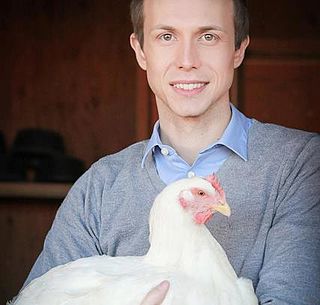A Quote by Bruce Friedrich
I'm convinced that welfare reforms deserve our support, both because they are better (or at least much less bad) for the animals involved (the Golden Rule), and because they push the envelope, moving us closer to the compassionate world that all animal rights activists are working toward...On the other hand, working toward welfare reforms has the immediate benefit of helping improve animals' lives today and acts as a crucial stepping stone toward animal liberation.
Quote Topics
Activists
Acts
Animal
Animal Liberation
Animal Rights
Animal Rights Activists
Animals
Bad
Because
Benefit
Better
Both
Closer
Compassionate
Convinced
Crucial
Deserve
Envelope
Golden
Golden Rule
Hand
Helping
Immediate
Improve
Involved
Least
Less
Liberation
Lives
Moving
Much
Other
Our
Push
Reforms
Rights
Rule
Stepping
Stepping Stone
Stone
Support
The Golden Rule
Today
Toward
Us
Welfare
Welfare Reform
Working
World
Related Quotes
Not only are the philosophies of animal rights and animal welfare separated by irreconcilable differences... the enactment of animal welfare measures actually impedes the achievement of animal rights... Welfare reforms, by their very nature, can only serve to retard the pace at which animal rights goals are achieved.
Whatever the reason, for most of the present century, the literature and publicity of the old established [animal welfare] groups made a significant contribution to the prevailing attitude that dogs and cats and wild animals need protection, but other animals do not. Thus people came to think of "animal welfare" as something for kindly ladies who are dotty about cats, and not as a cause founded on basic principles of justice and morality.
I believe that the best way to create good living conditions for any animal, whether it's a captive animal living in a zoo, a farm animal or a pet, is to base animal welfare programs on the core emotion systems in the brain. My theory is that the environment animals live in should activate their positive emotions as much as possible, and not activate their negative emotions any more than necessary. If we get the animal's emotions rights, we will have fewer problem behaviors... All animals and people have the same core emotion systems in the brain.
Stay positive, joyful, and optimistic in your activism, even in the face of adversity. Understand that most people continue to consume animal products because they are unaware of the hidden cost - animal cruelty - not because they are bad or apathetic. Offer information, support, and resources in a friendly and supportive manner, as few people have begun their journey toward a compassionate lifestyle by being shamed or ridiculed. Turn anger and frustration into motivation to be as effective as possible.
Humans — who enslave, castrate, experiment on, and fillet other animals — have had an understandable penchant for pretending animals do not feel pain. A sharp distinction between humans and 'animals' is essential if we are to bend them to our will, make them work for us, wear them, eat them — without any disquieting tinges of guilt or regret. It is unseemly of us, who often behave so unfeelingly toward other animals, to contend that only humans can suffer. The behavior of other animals renders such pretensions specious. They are just too much like us.
The indifference, callousness and contempt that so many people exhibit toward animals is evil first because it results in great suffering in animals, and second because it results in an incalculably great impoverishment of the human spirit. All education should be directed toward the refinement of the individual's sensibilities in relation not only to one's fellow humans everywhere, but to all things whatsoever.
I think the primary gift of the animal is offered to writer and non-writer alike; they teach us about love, or attunement, which is love in action. A lot of people have closer relationships with animals than they do with other humans, because real intimacy requires both parties to consistently lean in, and animals are so good at this. They remain consistently, amazingly attuned to us, even when we fail them, and so we stay present, because we sense we're safe.
To be proactive is to educate yourself and get the word out via social media, or through one of the many animal-welfare organizations around the world, and by signing petitions, starting your own campaigns, rescuing and fostering animals, organizing cleanups, recycling, volunteering at your local animal shelter, going to eco-tourist destinations or photo safaris. This will help get the word out to the masses, and hopefully, this will bring more awareness and more compassion to animal welfare.




































